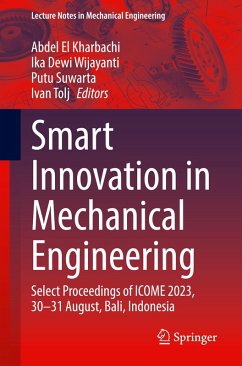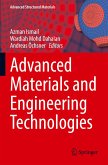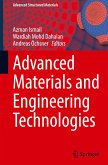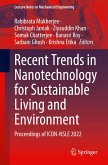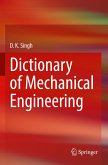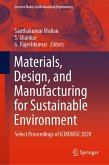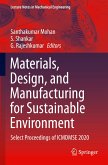Smart Innovation in Mechanical Engineering
Select Proceedings of ICOME 2023, 30-31 August, Bali, Indonesia
Herausgegeben:El Kharbachi, Abdel; Wijayanti, Ika Dewi; Suwarta, Putu; Tolj, Ivan
Smart Innovation in Mechanical Engineering
Select Proceedings of ICOME 2023, 30-31 August, Bali, Indonesia
Herausgegeben:El Kharbachi, Abdel; Wijayanti, Ika Dewi; Suwarta, Putu; Tolj, Ivan
- Broschiertes Buch
- Merkliste
- Auf die Merkliste
- Bewerten Bewerten
- Teilen
- Produkt teilen
- Produkterinnerung
- Produkterinnerung
This book presents the select proceedings of the 6th International Conference on Mechanical Engineering (ICOME) held from 30 to 31 August, in Bali, Indonesia. ICOME is a series of international conferences in mechanical engineering held every two years in Indonesia. The covered topics include aerodynamics and fluid mechanics, air conditioning and cooling systems, turbomachinery and alternative fuels, modeling, simulation and optimization, thermodynamics and heat transfer, and combustion systems. This book also covers advanced topics in materials for medical devices, defense, industrial…mehr
Andere Kunden interessierten sich auch für
![Advanced Materials and Engineering Technologies Advanced Materials and Engineering Technologies]() Advanced Materials and Engineering Technologies151,99 €
Advanced Materials and Engineering Technologies151,99 €![Advanced Materials and Engineering Technologies Advanced Materials and Engineering Technologies]() Advanced Materials and Engineering Technologies151,99 €
Advanced Materials and Engineering Technologies151,99 €![Recent Trends in Nanotechnology for Sustainable Living and Environment Recent Trends in Nanotechnology for Sustainable Living and Environment]() Recent Trends in Nanotechnology for Sustainable Living and Environment136,99 €
Recent Trends in Nanotechnology for Sustainable Living and Environment136,99 €![Dictionary of Mechanical Engineering Dictionary of Mechanical Engineering]() D. K. SinghDictionary of Mechanical Engineering166,99 €
D. K. SinghDictionary of Mechanical Engineering166,99 €![Materials, Design, and Manufacturing for Sustainable Environment Materials, Design, and Manufacturing for Sustainable Environment]() Materials, Design, and Manufacturing for Sustainable Environment113,99 €
Materials, Design, and Manufacturing for Sustainable Environment113,99 €![Materials, Design, and Manufacturing for Sustainable Environment Materials, Design, and Manufacturing for Sustainable Environment]() Materials, Design, and Manufacturing for Sustainable Environment113,99 €
Materials, Design, and Manufacturing for Sustainable Environment113,99 €![Recent Advances in Materials and Manufacturing Science Recent Advances in Materials and Manufacturing Science]() Recent Advances in Materials and Manufacturing Science151,99 €
Recent Advances in Materials and Manufacturing Science151,99 €-
-
-
This book presents the select proceedings of the 6th International Conference on Mechanical Engineering (ICOME) held from 30 to 31 August, in Bali, Indonesia. ICOME is a series of international conferences in mechanical engineering held every two years in Indonesia. The covered topics include aerodynamics and fluid mechanics, air conditioning and cooling systems, turbomachinery and alternative fuels, modeling, simulation and optimization, thermodynamics and heat transfer, and combustion systems. This book also covers advanced topics in materials for medical devices, defense, industrial independence, and mechanical science and technology advances. Given the contents, the book is useful for students, researchers, and professionals in the area of mechanical engineering and materials.
Produktdetails
- Produktdetails
- Lecture Notes in Mechanical Engineering
- Verlag: Springer / Springer Nature Singapore / Springer, Berlin
- Artikelnr. des Verlages: 89282670, 978-981-97-7897-3
- Seitenzahl: 608
- Erscheinungstermin: 17. März 2025
- Englisch
- Abmessung: 235mm x 155mm x 31mm
- Gewicht: 1012g
- ISBN-13: 9789819778973
- ISBN-10: 9819778972
- Artikelnr.: 71440464
- Herstellerkennzeichnung
- Springer-Verlag KG
- Sachsenplatz 4-6
- 1201 Wien, AT
- ProductSafety@springernature.com
- Lecture Notes in Mechanical Engineering
- Verlag: Springer / Springer Nature Singapore / Springer, Berlin
- Artikelnr. des Verlages: 89282670, 978-981-97-7897-3
- Seitenzahl: 608
- Erscheinungstermin: 17. März 2025
- Englisch
- Abmessung: 235mm x 155mm x 31mm
- Gewicht: 1012g
- ISBN-13: 9789819778973
- ISBN-10: 9819778972
- Artikelnr.: 71440464
- Herstellerkennzeichnung
- Springer-Verlag KG
- Sachsenplatz 4-6
- 1201 Wien, AT
- ProductSafety@springernature.com
Abdel El Kharbachi is a senior scientist at Helmholtz Institute Ulm (HIU), Germany. He graduated (Licence/DEA) from the University of Liège (Belgium) in RTILs non-aqueous electrochemistry and completed a Ph.D. research studies in Materials Science and Engineering from Grenoble Institute of Technology (France). He was a postdoctoral fellow in France at both the CEA-Saclay (for ITER Tokamak) and CNRS-Amiens (Lab Réactivité et Chimie des Solides), from which he gained research independence and extensive experience in energy materials synthesis, characterization, and the understanding of relevant structure-property relationships. From 2015 to 2018, he worked at IFE-Norway as a researcher and project leader for battery-related activities based on (boro) hydrides. In 2021, he received a Grant for the Program of Excellent Junior Researchers by the Sino-German Center for Research Promotion. Ika Dewi Wijayanti is an accomplished researcher and educator in the field of metal hydride batteries, electrospinning technology, and material characterization. With a Philosophy of Doctor degree from NTNU University, Norway, she holds the position of Assistant Professor at Institut Teknologi Sepuluh Nopember, Department of Mechanical Engineering. Her contributions span metal hydride battery and electrospinning technology research, encompassing experimental investigations. She actively imparts knowledge through teaching various courses and leads research projects focused on metal hydride battery and renewable energy systems. Putu Suwarta is an accomplished researcher and educator in the field of composite materials, fracture mechanics, material characterizations, and multifunctional materials. He obtained a Philosophy of Doctor degree from the University of Bristol in the pseudo-ductile behavior of the unidirectional composite research field. He actively imparts knowledge through teaching various courses and leads research projects focused on multifunctional composite materials and fracture mechanics. He also holds the role of visiting associate researcher at Bristol Composite Institute, one of the research institutes at the University of Bristol from 2020 to 2025. With extensive collaborations with industry and academic partners, numerous scientific publications, and important editorial and reviewer roles, he is a respected figure in advancing the field of multifunctional composite material. Ivan Tolj graduated from the Faculty of Electrical Engineering, Mechanical Engineering, and Naval Architecture (FESB) at the University of Split (Croatia) in 2005. He began his career at the same faculty in 2006 as a research/teaching assistant, working on a project financed by the Ministry of Science, Education, and Sports of the Republic of Croatia. The project, titled "Passive Fuel Cells to Supply Oxygen from the Air by Natural Convection," aimed to explore fuel cell technology. His contributions spanned both the modeling and experimental aspects of fuel cell research and development. Currently, he holds the position of Associate Professor at FESB in the Department of Thermodynamics. His current research revolves around hydrogen technologies, encompassing areas such as fuel cells, hydrogen production, storage and compression, fuel cell hybrid system energy management and control, and more.
The Tensile Stress Enhancement of Corner-Lap Joint 450 (C-L45) Using Friction Stir Welding.- Tool Life Simulation on Hot Forging Process for Femoral Stem of Hip Arthroplasty.-
Stress Analysis of API 5L X80 Pipe with Dent Caused by Indenter Ripper Bucket Teeth.- The role of circular cylinders in improving the performance of the Savonius wind turbine.-
Green Hydrometallurgy Process of Iron using Organic Solutions (Citric and Glutamate) for Ferronickel's by products: Preliminary.- Isotropic Body-Centered Cubic (BCC) Lattice Structure Design.- Experimental Study of anti-friction Bearing Failure Based on characteristic of Machine Frequency Defect.- Strength Analysis of MEVITS (Multi-Purpose Electric Vehicle ITS) Chassis Ladder Frame Type Due to Static and Dynamic Loads on Life Fatigue.- The Effect of Various Structure Mass to the Dynamic Response and User Convenience in 3D Printed Articulated and Non-Articulated Ankle Foot Orthosis.-Design of Toilet Pressure Control System Based on PLC for Train Carriages Implementation.-Colloidal ZnO- Prepared Using Ethanol as Solvent in its Future Application to Produce ZnO-SiO2 Nanoparticles Using Electrospray Method.-PID Control for Radial Active Magnetic Bearings.- Numerical Study of The Effect of The Upstream Installation of the D-Type Cylinders On The Performance Of The Savonius Wind Turbine.
Stress Analysis of API 5L X80 Pipe with Dent Caused by Indenter Ripper Bucket Teeth.- The role of circular cylinders in improving the performance of the Savonius wind turbine.-
Green Hydrometallurgy Process of Iron using Organic Solutions (Citric and Glutamate) for Ferronickel's by products: Preliminary.- Isotropic Body-Centered Cubic (BCC) Lattice Structure Design.- Experimental Study of anti-friction Bearing Failure Based on characteristic of Machine Frequency Defect.- Strength Analysis of MEVITS (Multi-Purpose Electric Vehicle ITS) Chassis Ladder Frame Type Due to Static and Dynamic Loads on Life Fatigue.- The Effect of Various Structure Mass to the Dynamic Response and User Convenience in 3D Printed Articulated and Non-Articulated Ankle Foot Orthosis.-Design of Toilet Pressure Control System Based on PLC for Train Carriages Implementation.-Colloidal ZnO- Prepared Using Ethanol as Solvent in its Future Application to Produce ZnO-SiO2 Nanoparticles Using Electrospray Method.-PID Control for Radial Active Magnetic Bearings.- Numerical Study of The Effect of The Upstream Installation of the D-Type Cylinders On The Performance Of The Savonius Wind Turbine.
The Tensile Stress Enhancement of Corner-Lap Joint 450 (C-L45) Using Friction Stir Welding.- Tool Life Simulation on Hot Forging Process for Femoral Stem of Hip Arthroplasty.-
Stress Analysis of API 5L X80 Pipe with Dent Caused by Indenter Ripper Bucket Teeth.- The role of circular cylinders in improving the performance of the Savonius wind turbine.-
Green Hydrometallurgy Process of Iron using Organic Solutions (Citric and Glutamate) for Ferronickel's by products: Preliminary.- Isotropic Body-Centered Cubic (BCC) Lattice Structure Design.- Experimental Study of anti-friction Bearing Failure Based on characteristic of Machine Frequency Defect.- Strength Analysis of MEVITS (Multi-Purpose Electric Vehicle ITS) Chassis Ladder Frame Type Due to Static and Dynamic Loads on Life Fatigue.- The Effect of Various Structure Mass to the Dynamic Response and User Convenience in 3D Printed Articulated and Non-Articulated Ankle Foot Orthosis.-Design of Toilet Pressure Control System Based on PLC for Train Carriages Implementation.-Colloidal ZnO- Prepared Using Ethanol as Solvent in its Future Application to Produce ZnO-SiO2 Nanoparticles Using Electrospray Method.-PID Control for Radial Active Magnetic Bearings.- Numerical Study of The Effect of The Upstream Installation of the D-Type Cylinders On The Performance Of The Savonius Wind Turbine.
Stress Analysis of API 5L X80 Pipe with Dent Caused by Indenter Ripper Bucket Teeth.- The role of circular cylinders in improving the performance of the Savonius wind turbine.-
Green Hydrometallurgy Process of Iron using Organic Solutions (Citric and Glutamate) for Ferronickel's by products: Preliminary.- Isotropic Body-Centered Cubic (BCC) Lattice Structure Design.- Experimental Study of anti-friction Bearing Failure Based on characteristic of Machine Frequency Defect.- Strength Analysis of MEVITS (Multi-Purpose Electric Vehicle ITS) Chassis Ladder Frame Type Due to Static and Dynamic Loads on Life Fatigue.- The Effect of Various Structure Mass to the Dynamic Response and User Convenience in 3D Printed Articulated and Non-Articulated Ankle Foot Orthosis.-Design of Toilet Pressure Control System Based on PLC for Train Carriages Implementation.-Colloidal ZnO- Prepared Using Ethanol as Solvent in its Future Application to Produce ZnO-SiO2 Nanoparticles Using Electrospray Method.-PID Control for Radial Active Magnetic Bearings.- Numerical Study of The Effect of The Upstream Installation of the D-Type Cylinders On The Performance Of The Savonius Wind Turbine.

